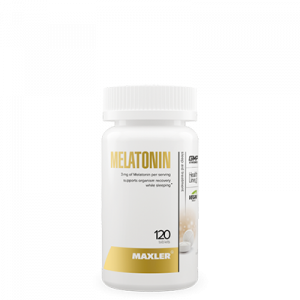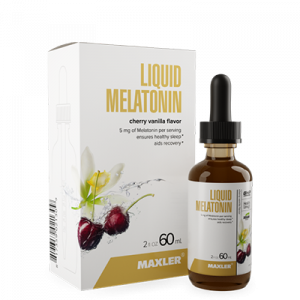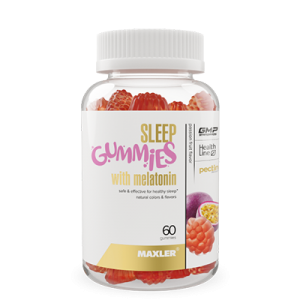Melatonin, the so-called sleeping hormone, is present not only in all animals, but also single-celled organisms and even plants! It regulates daily and seasonal rhythms in living organisms and is a powerful antioxidant, which allows it to slow down ageing and increase lifespan. People who live the longest have an increased level of melatonin.
Melatonin is an antagonist to the stress hormone cortisol and protects the body from the detrimental effects caused by high levels of cortisol during chronic stress. Melatonin affects carbohydrate metabolism, insulin secretion and food related behaviour. Melatonin is called the sleeping hormone. Like a light version of a sleeping pill, it causes us to fall asleep. However, it is only produced in necessary amounts at night.
When and how is melatonin produced?
In humans, melatonin is produced mainly in the epiphysis – the pineal gland or the “third eye” – but that is not the only place it is produced in. Other organs, like the appendix, gut, retina, lungs, placenta can also produce small amounts of this hormone.
So, during the day, L-tyrosine, an essential amino acid, is converted to serotonin, a neurotransmitter, which is called the “happiness hormone” or the “good mood hormone.” It is known that the levels of serotonin peak during moments of happiness and fall when one is depressed.
Serotonin synthesis happens in two places. 90% of the synthesis happens in the gut (no wonder the stomach is called the second brain), and the rest in the pineal gland in the brain.
As the serotonin in the gut cannot cross the blood-brain barrier, the small dose of serotonin synthesised by the pineal gland becomes melatonin during the night. The change from night to day, light and dark, is needed for the cyclic synthesis of serotonin and melatonin, which shows the harmony and wisdom of nature.
In contrast to serotonin, melatonin can easily move within the body, as every tissue and organ requires it!
Melatonin is transported by serum albumin, which doctors pay attention to when they take blood for blood tests. It transports melatonin from the brain through to the cells of the whole organism. Melatonin has the highest “availability” – its “key” opens not only cell membranes, but also nuclear membranes, allowing it to act directly on DNA. It corrects damage done to the DNA by free radicals and prevents further damage through its antioxidant properties.
Unused melatonin gets transported into the liver and excreted with the help of the kidneys.
The hormone of darkness
The active and largest amount of melatonin is synthesised in the pineal gland, at night, in complete darkness.
Any interaction with light, even if it is short or with closed eyes stops the synthesis of this elixir of longevity and health. The spectrum of light plays a large role – green and blue light are the most aggressive in this case, while red and orange are softer.
It is also important to know that the peak of melatonin synthesis, like the peak of somatotropin synthesis, falls in the short period between 11pm and 2am. Somatotropin is another growth hormone.
Because of these two reasons, the healthiest and most regenerating sleep can only be obtained by going to bed before 11pm. Not using sources of blue light before and during sleep is also key. This applies even to minimal sources of light, not only to smartphones and laptops.
Melatonin – one of the body’s main endogenous antioxidants
According to many studies, melatonin neutralises free radicals better than such powerful antioxidants as glutathione and vitamin E.
Melatonin itself, as an antioxidant, binds free radicals and carcinogens that enter the body and activates another important protective factor – glutathione peroxidase. Glutathione peroxidase is an enzyme which reduces the amount of the most damaging free radical, hydroxide. This is especially important for brain health. Through these actions, melatonin prevents the development of many diseases from colds to cancer.
Since brain neurons are one of the main targets of free radicals, melatonin can inhibit the development of neurodegenerative diseases such as Alzheimer’s and Parkinson’s disease.
Factors that reduce the production of melatonin
Night flights, night shift work, regular late bedtimes, and lack of darkness in the bedroom can seriously interfere with melatonin synthesis.
Caffeine, alcohol and smoking, large amounts of sugar in the diet, certain drugs (like painkillers, antidepressants, glucocorticoids, non-steroidal anti-inflammatory drugs, vitamin B12, beta-blockers) decrease the levels of melatonin production. It has been shown that during periods of geomagnetic storms, there is a decrease in melatonin levels.T
he amount of melatonin decreases significantly with age, although it is interesting that centenarians demonstrate similar levels to those found in youth.
How to help the body retain an optimal level of melatonin
Sleeping in dark rooms, early bedtimes, meditation, supplementing calcium, magnesium, and Vitamin B6 are helpful.
It is also suggested that consuming foods with a high level of tryptophan, such as cheese, red caviar, herring, cod, cottage cheese, bananas, dates, eggs, legumes, nuts, seafood, turkey, and porcini mushrooms six hours before bedtime helps to increase melatonin synthesis.
Melatonin supplements
Biologically active melatonin supplements help to increase chronically low levels of melatonin in the body. This helps to normalise sleep, correct circadian rhythms during travel across multiple time zones and increase antioxidant activity.
Supplements not only help to increase levels of melatonin but have also been clinically shown to improve function of the cardio-vascular system, improve fibromyalgia, reduce the risk of gallstones, and reduce sensations of tinnitus. In these cases, it is important to get melatonin prescribed by a doctor.
An overdose of melatonin may be accompanied by daytime sleepiness, irritability, vivid dreams, restlessness, discomfort in the abdomen. Additionally, melatonin should not be consumed with alcohol, as that increases melatonin’s sedative effects.
Maxler has three melatonin supplements, each in a different form to guarantee that there is something for everyone. All of the supplements are vegan-friendly.
Maxler Melatonin Tablets are an easy way to get melatonin in. Containing 3mg of melatonin, they are perfect for those, who may want to give melatonin a try, and know that a tablet form works for them.
Maxler Sleep Gummies with Melatonin will make taking melatonin something you look forward to every night. The gummies additionally contain Vitamin B6, which may improve dream recall and help treat insomnia in complex with melatonin. Passion fruit flower extract has also been shown to be a powerful sleep inducer. The gummies are perfect for adults, teens and children.











